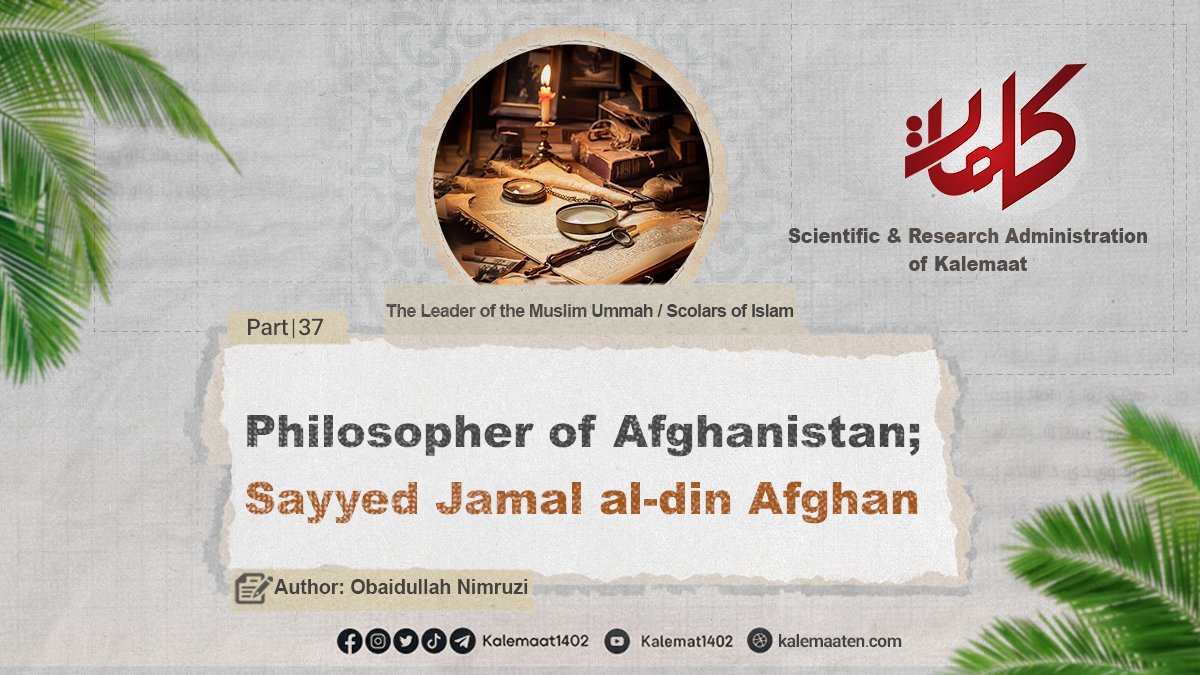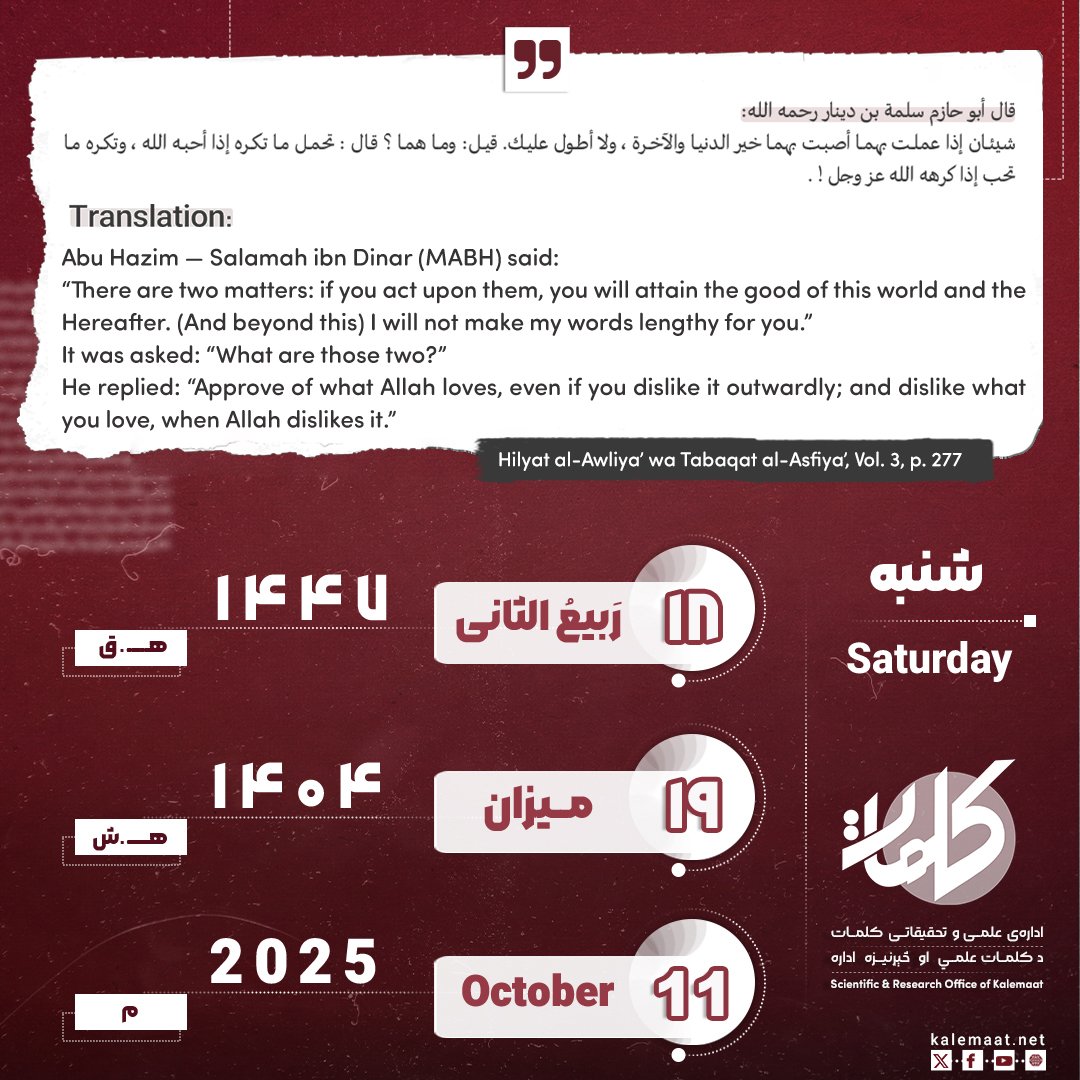
Author: Obaidullah Nimruzi
Philosopher of Afghanistan; Sayyed Jamal al-din Afghan (Part 37)
A Man from the East in the Land of the West
Keywords: Awakening, Colonialism, Reform, West, Unity, Resistance
Abstract
In the contemporary history of the Islamic world, few personalities can be found who, like Sayyed Jamal al-din Asad Abadi (MABH), were simultaneously religious jurists, shrewd politicians, and reformist and revolutionary thinkers. Emerging from the heart of the East and its colonial suffering, he became a global figure in the mid-19th and early 20th centuries whose ideas transcended borders. His presence in the West brought about a significant transformation in mutual perceptions between East and West. The topic “A Man from the East in the Land of the West” is important because Sayyed Jamal al-din did not present himself to the West merely as a political guest or helpless exile; rather, as a global reformer with a precise and analytical approach rooted in Islamic principles, he critically examined Western civilization, colonial policies, and the contradictions of modernity.
In Paris—a major center of European civilization—Sayyed Jamal not only did not lose his identity but also, by founding al-Urwah al-Wuthqa magazine and contributing to newspapers, became the resonant voice of the East and a defender of oppressed nations. While in the heart of the Western world, he became the voice and awakened conscience of peoples who had not yet found the strength to cry out. In his view, genuine reform was only possible through intellectual awakening, revival of religious spirit, and Muslim unity. Accordingly, his deep exposés against British colonial policies, his enlightenment regarding Western oppression in India, Egypt, and Sudan, and his opposition to the intellectual and cultural domination of the West over the Islamic world earned him a special place in the anti-colonial thought of Muslims.
His meetings with European political figures—including Lord Salisbury and Lord Churchill—demonstrated the high level of his influence in Western decision-making circles. He never sought position through flattery or political maneuvering; instead, he always spoke with the voice of criticism and truth, even before the most powerful faces of the British Empire. When he was offered the kingship of Sudan, rather than bowing in greed for power, he responded: “This is a foolish policy, and nothing more despicable can be imagined. Is Sudan your property that you assign it a king?”
This decisive and unhesitating response not only reflected his intellectual independence and moral integrity but also revealed the depth of his belief in the rights of nations and his categorical opposition to colonialism.
In the West, Sayyed Jamal, with an insider’s perspective rooted in Islamic tradition and awareness of the demands of the modern world, built an intellectual project that laid the foundation for future Islamic awakening movements. In the West, instead of passivity or astonishment, he chose scholarly critique and cultural resistance. His profound writings, oratory, and political articles in French newspapers made even Western audiences reflect, and independent-minded Western thinkers echoed his views in their own media.
Although this presence faced obstacles such as censorship, publication bans, and security pressures from colonial governments, it nevertheless created a historical and discursive achievement for modern Muslim history. The influence of al-Urwah al-Wuthqa magazine and the ideas published in it continued to inspire political, reformist, and anti-colonial movements across the Islamic world for decades.
In short, Sayyed Jamal al-din was a man from the East who, in the West, not only did not remain silent but turned into a shining star that continues to illuminate the intellectual horizon of the Muslim Ummah. He is a symbol of a man who, through his adherence to faith and reason, not only transformed his own world but also taught Muslims the power of dialogue and confrontation with aggressive civilization.
Introduction
Throughout the turbulent history of contemporary Islam, there have emerged figures whose roles extended beyond the geographical confines of their birthplace and influenced a vast expanse of the Islamic world—and even the realms of global politics and thought. Among these prominent personalities, the name of Sayyed Jamal al-din Asadabadi (MABH) shines with special significance and credibility. A man from the East, he rose like a glowing torch in the darkness of backwardness, colonialism, and ignorance, and made the voice of awakening echo not only throughout the Islamic East but also in the heart of the Western world.
Sayyed Jamal al-din was a son of the East, yet his vision carried a universal mission. He clearly recognized that the fragmentation of the Islamic world, scientific and cultural decline, political despotism, and Western military and intellectual dominance over the East were the result of Muslims’ estrangement from the essence of Islam and religious wisdom. What distinguished him from other contemporary reformers was not only his insight and diagnostic ability, but his courage to act, his daring journeys, his establishment of intellectual and political networks, and his direct engagement with decision-making circles in Europe.
The title “A Man from the East in the Land of the West” does not merely describe Sayyed Jamal’s geographical presence in Europe (especially France and Britain), but conveys a deeper meaning. In an era when many Eastern intellectuals either felt self-contempt before Western civilization or were dazzled into submission, he entered the West with firm posture and, with all his intellectual, literary, and rhetorical strength, confronted the unjust structures and colonial views of the West toward the East. He did not speak from a position of weakness, but from awareness and religious conviction, and he demonstrated to the world that Islam possesses profound intellectual, civilizational, and human foundations.
In Paris, he founded the revolutionary al-Urwah al-Wuthqa magazine. Though short-lived, its influence on Islamic awakening was enduring. In his articles and speeches, he boldly spoke of the rights of nations, human freedom, the necessity of Muslim unity, the danger of colonialism, and the corruption of treacherous rulers. In this path, he did not fear persecution, exile, censorship, or political exclusion.
His direct meetings with European political figures such as Lord Salisbury and Churchill not only reflected his intellectual and scholarly status but also showed that the Western world recognized the extent of his influence. Yet these meetings often ended with surprise—or even failure—because Sayyed Jamal was not a politician seeking expediency but a truthful and idealistic reformer. When the British proposed he become the king of Sudan, he stood firm against greed and sycophancy and boldly said to the Lord: “Is Sudan your property that you assign it a king?”
This research, focusing on the chapter “A Man from the East in the Land of the West,” seeks to meticulously examine the ideas, positions, and actions of Sayyed Jamal al-din in the West and to analyze his place in the history of Islamic political thought. The al-Urwah al-Wuthqa magazine will be highlighted as a special intellectual and revolutionary tool. This article will also explore the West’s reaction to Sayyed Jamal’s presence and thought, as well as his interaction with European intellectuals and media figures.
Undoubtedly, understanding Sayyed Jamal al-din’s presence in the West not only leads to a deeper knowledge of this great reformer’s character but also offers a clearer image of East-West relations in the 19th century and the beginning of the Islamic awakening. He was a man who defended the East while in the West—not with emotional outcry, but with the logic of reason, the argument of religion, and human dignity.
A Man from the East in the Land of the West
Sayyed Jamal al-din traveled from India to Britain and stayed for a few weeks in its capital. The American writer S.D. Wilson, in his book al-Harakāt al-Hadīthah (The Modern Movements), believed that Sayyed had gone to America before his journey to England and intended to acquire American citizenship but eventually gave up on this idea. Similarly, Mr. Wilfrid Blunt also raised points regarding this. However, most of the authors who have written about Sayyed Jamal al-din, and his life have not mentioned this issue. Those few who have referred to it have either rejected its occurrence or considered it unacceptable. [1]
Continues…
Previous Part/ Next Part
[1]. Graham, Samuel Wilson, Modern Movements Among Muslims, Year Published: 1916 AD. Publisher: New York, Chicago: Fleming H. Revell company.


